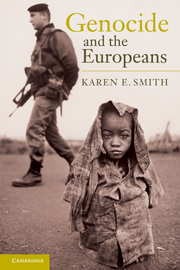Book contents
- Frontmatter
- Contents
- Tables and boxes
- Acknowledgements
- Abbreviations
- 1 The norms against genocide
- 2 European governments and the development of the international legal framework on genocide
- 3 European discourses on genocide during the Cold War
- 4 Bosnia and Herzegovina
- 5 Rwanda
- 6 Kosovo
- 7 Darfur
- 8 Is there a European way of responding to genocide?
- Appendix 1 United Nations General Assembly Resolution 96 (I), 11 December 1946
- Appendix 2 Convention on the Prevention and Punishment of the Crime of Genocide
- Bibliography
- Index
Appendix 1 - United Nations General Assembly Resolution 96 (I), 11 December 1946
Published online by Cambridge University Press: 05 June 2012
- Frontmatter
- Contents
- Tables and boxes
- Acknowledgements
- Abbreviations
- 1 The norms against genocide
- 2 European governments and the development of the international legal framework on genocide
- 3 European discourses on genocide during the Cold War
- 4 Bosnia and Herzegovina
- 5 Rwanda
- 6 Kosovo
- 7 Darfur
- 8 Is there a European way of responding to genocide?
- Appendix 1 United Nations General Assembly Resolution 96 (I), 11 December 1946
- Appendix 2 Convention on the Prevention and Punishment of the Crime of Genocide
- Bibliography
- Index
Summary
The Crime of Genocide
Genocide is a denial of the right of existence of entire human groups, as homicide is the denial of the right to live of individual human beings; such denial of the right of existence shocks the conscience of mankind, results in great losses to humanity in the form of cultural and other contributions represented by these human groups, and is contrary to moral law and to the spirit and aims of the United Nations.
Many instances of such crimes of genocide have occurred, when racial, religious, political and other groups have been destroyed, entirely or in part.
The punishment of the crime of genocide is a matter of international concern.
The General Assembly, therefore,
Affirms that genocide is a crime under international law which the civilized world condemns, and for the commission of which principals and accomplices – whether private individuals, public officials or statesmen, and whether the crime is committed on religious, racial, political or any other grounds – are punishable;
Invites the Member States to enact the necessary legislation for the prevention and punishment of this crime;
Recommends that international co-operation be organized between States with a view to facilitating the speedy prevention and punishment of the crime of genocide, and, to this end,
Requests the Economic and Social Council to undertake the necessary studies, with a view to drawing up a draft convention on the crime of genocide to be submitted to the next regular session of the General Assembly.
- Type
- Chapter
- Information
- Genocide and the Europeans , pp. 254Publisher: Cambridge University PressPrint publication year: 2010
- 4
- Cited by

